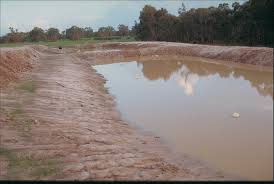FIRE-AFFECTED farmers are being encouraged to consider long-term strategies to prevent organic pollution entering farm dams, as thunderstorms and flash flooding become the latest threat.
 Fire, combined with dry conditions, has left ground cover at critically low levels, making it easier for dung and other organic materials to blow into dams and putrefy.
Fire, combined with dry conditions, has left ground cover at critically low levels, making it easier for dung and other organic materials to blow into dams and putrefy.
Agriculture Victoria land management extension officer Brad Costin said long-term management was key and would prevent farmers having to clean out dams multiple times.
“It’s important to remove organic material from the water as soon as possible, as it usually saturates and sinks within 48 hours, so skimming the surface of the water is the most effective short-term method,” he said.
“The palatability of the water can be improved by aeration and or chemical treatment, which may be done simultaneously.
“On smaller catchments other sediment control measures may be an option, such as sediment fences or barriers, so seek advice when deciding how to respond.
“Otherwise prioritising water storages and allowing for contingencies should dams become unavailable may need to be considered in the short-term.
“The best long-term prevention is to maintain an adequate vegetative cover around the dam or where this is not possible establish protection with netting or corrugated iron or earth banks.”
Source: Agriculture Victoria
For more information visit: agriculture.vic.gov.au/agriculture/farm-management/managing-dams/organic-pollution-in-farm-dams

HAVE YOUR SAY